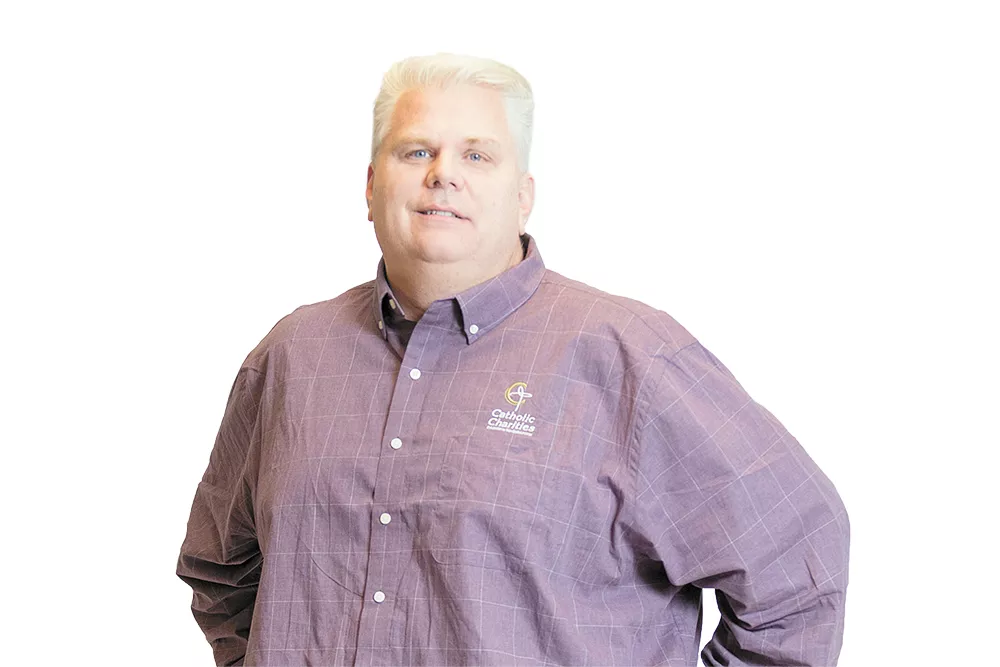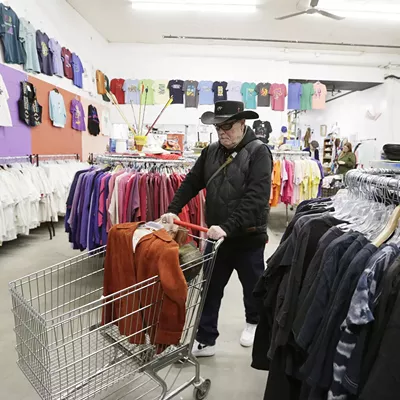Seventy-thousand different people. That's how many are served by Catholic Charities of Eastern Washington every year, a figure that includes veterans, seniors, teen mothers, new immigrants and people with drug or mental health issues, says CEO Rob McCann, 49.
But it's a tiny sliver of that total — the chronically homeless people on the streets — who gets the most attention. "I spend 90 percent of my time talking about the less than 1,000 people we serve" at the House of Charity shelter and at other Catholic Charities' properties, he says.
McCann believes that Spokane can actually solve homelessness, that our region is better positioned than most to do it. But he sees a growing trend that won't make it any easier: "There is a new ideological premise about serving the poor that did not exist five years ago, but it exists very firmly today ... that there are such things as 'deserving' and 'undeserving' poor."
Our interview with McCann has been edited for clarity and space.
INLANDER: What do you think the community — and local leaders — misunderstand about homelessness?
McCANN: There are a lot of misperceptions about what we're doing with homelessness in Spokane. The most common one is: Are we attracting more homeless people? You know, we use data to answer these questions. And about 80 percent to 85 percent of our House of Charity folks are born and raised within 75 miles of downtown Spokane. So we're not attracting new homeless people. The food is not so good at the House of Charity that they're coming from Alabama, Texas and Florida.
The second one is that we're enabling people, that when we let people come into the House of Charity who are still actively struggling with their addiction, we are enabling them to keep using or keep drinking. Our response to that is pretty simple: We believe every human being is made in the image and likeness of God. And if that's true, then every human being deserves the dignity and the basic respect of going to the bathroom, eating and sleeping indoors.
We both probably hear anecdotes from people who say they're scared to go downtown, who say, "Downtown is getting overrun by homeless people." What's your short answer to them?
When someone says they're unsafe downtown, that's coded language. What they're really saying is, "I feel uncomfortable, because I don't like to look at that. I don't like to go to the Apple store to buy my new iPhone and have to walk by someone who's sitting on the sidewalk in front of the store. That makes me feel bad." You know, it's our job as a community to make it a safe place, to make it a respectful and dignified place. It's not necessarily our job to make everyone feel comfortable about how they feel about people who are in need.
But there are people downtown who are up to no good. They are typically not our Catholic Charities people. ... We are so sure that those criminal people aren't our people that we absolutely want them arrested because the No. 1 people they rob or beat up are our clients. So we want them out of the downtown core just the same as the business owners do.
Talk about what happened to the 24/7 shelter model, because that did seem like a moment of great optimism, but then it suddenly collapsed.
There was very good news and very bad news. The good news was that we came as close to solving street homelessness in Spokane as we ever have when we had 24/7 sheltering. There were very few people left outside in downtown Spokane. Business owners would tell you that, the police would tell you that. When 24/7 was open at the House of Charity, we were really close to functional zero on-street homelessness in Spokane.
The bad news is it made the block around House of Charity look like a war zone. House of Charity was built to sleep 109 men only. During 24/7 we were sleeping between 300 and 400 men, women, couples and their dogs. The front of the House of Charity, unfortunately, looked like Eastern State Hospital and the jail were having a Woodstock Festival. We realized the House of Charity can't do it all. There needed to be a second shelter.
Then the city funding ran out. The city's plan was, "We're going to stop 24/7 shelter, but we're going to open another shelter." We said, "Great, let us know how we can help." Then the city did everything they could, but they still have not opened that second shelter.
Your organization was recently awarded a $5 million grant from Jeff Bezos' foundation. What will that mean?
That money is specifically for family homelessness. So unfortunately, I can't pump any of that money into the House of Charity, but we can put it into our family shelters, into our homeless family housing — all of our programs that serve anyone who's in a family that's homeless or at risk of being homeless. ... We're going to use some of this money to get to functional zero on family homelessness in the rural areas of Eastern Washington. ♦





















